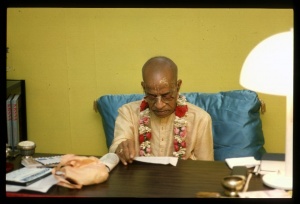CC Adi 17.65 (1975): Difference between revisions
(Vanibot #0027: CCMirror - Mirror CC's 1996 edition to form a basis for 1975) |
(Vanibot #0020: VersionCompareLinker - added a link to the Version Compare feature) |
||
| Line 2: | Line 2: | ||
<div style="float:left">'''[[Sri Caitanya-caritamrta (1975)|Śrī Caitanya-caritāmṛta (1975)]] - [[CC Adi (1975)|Ādi-līlā]] - [[CC Adi 17 (1975)|Chapter 17: The Pastimes of Lord Caitanya Mahāprabhu in His Youth]]'''</div> | <div style="float:left">'''[[Sri Caitanya-caritamrta (1975)|Śrī Caitanya-caritāmṛta (1975)]] - [[CC Adi (1975)|Ādi-līlā]] - [[CC Adi 17 (1975)|Chapter 17: The Pastimes of Lord Caitanya Mahāprabhu in His Youth]]'''</div> | ||
<div style="float:right">[[File:Go-previous.png|link=CC Adi 17.64 (1975)|Ādi-līlā 17.64]] '''[[CC Adi 17.64 (1975)|Ādi-līlā 17.64]] - [[CC Adi 17.66 (1975)|Ādi-līlā 17.66]]''' [[File:Go-next.png|link=CC Adi 17.66 (1975)|Ādi-līlā 17.66]]</div> | <div style="float:right">[[File:Go-previous.png|link=CC Adi 17.64 (1975)|Ādi-līlā 17.64]] '''[[CC Adi 17.64 (1975)|Ādi-līlā 17.64]] - [[CC Adi 17.66 (1975)|Ādi-līlā 17.66]]''' [[File:Go-next.png|link=CC Adi 17.66 (1975)|Ādi-līlā 17.66]]</div> | ||
{{CompareVersions|CC|Adi 17.65|CC 1975|CC 1996}} | |||
{{RandomImage}} | {{RandomImage}} | ||
==== TEXT 65 ==== | ==== TEXT 65 ==== | ||
| Line 32: | Line 31: | ||
<div class="purport"> | <div class="purport"> | ||
Mukunda Datta was once forbidden to enter the association of | Mukunda Datta was once forbidden to enter the association of Śri Caitanya Mahāprabhu because of his mixing with the Māyāvādī impersonalists. When Lord Caitanya manifested His mahā-prakāśa, He called all the devotees one after another and blessed them, while Mukunda Datta stood outside the door. The devotees informed the Lord that Mukunda Datta was waiting outside, but the Lord replied, "I shall not soon be pleased with Mukunda Datta, for he explains devotional service among devotees, but then he goes to Māyāvādīs to hear from them the Yoga-vāśiṣṭha-rāmāyaṇa, which is full of Māyāvāda philosophy. For this I am greatly displeased with him." Hearing the Lord speak in that way, Mukunda Datta, standing outside, was exceedingly glad that the Lord would at some time be pleased with him, although He was not pleased at that moment. But when the Lord understood that Mukunda Datta was going to give up the association of the Māyāvādīs for good, He was pleased, and He at once called to see Mukunda. Thus He delivered him from the association of the Māyāvādīs and gave him the association of pure devotees. | ||
</div> | </div> | ||
Latest revision as of 16:44, 26 January 2020

A.C. Bhaktivedanta Swami Prabhupada
TEXT 65
- mukunda-dattere kaila daṇḍa-parasāda
- khaṇḍila tāhāra cittera saba avasāda
SYNONYMS
mukunda-dattere—unto Mukunda Datta; kaila—did; daṇḍa—punishment; parasāda—benediction; khaṇḍila—vanquished; tāhāra—his; cittera—of the mind; saba—all kinds of; avasāda—depressions.
TRANSLATION
Lord Śrī Caitanya Mahāprabhu blessed Mukunda Datta with punishment and in that way vanquished all his mental depression.
PURPORT
Mukunda Datta was once forbidden to enter the association of Śri Caitanya Mahāprabhu because of his mixing with the Māyāvādī impersonalists. When Lord Caitanya manifested His mahā-prakāśa, He called all the devotees one after another and blessed them, while Mukunda Datta stood outside the door. The devotees informed the Lord that Mukunda Datta was waiting outside, but the Lord replied, "I shall not soon be pleased with Mukunda Datta, for he explains devotional service among devotees, but then he goes to Māyāvādīs to hear from them the Yoga-vāśiṣṭha-rāmāyaṇa, which is full of Māyāvāda philosophy. For this I am greatly displeased with him." Hearing the Lord speak in that way, Mukunda Datta, standing outside, was exceedingly glad that the Lord would at some time be pleased with him, although He was not pleased at that moment. But when the Lord understood that Mukunda Datta was going to give up the association of the Māyāvādīs for good, He was pleased, and He at once called to see Mukunda. Thus He delivered him from the association of the Māyāvādīs and gave him the association of pure devotees.